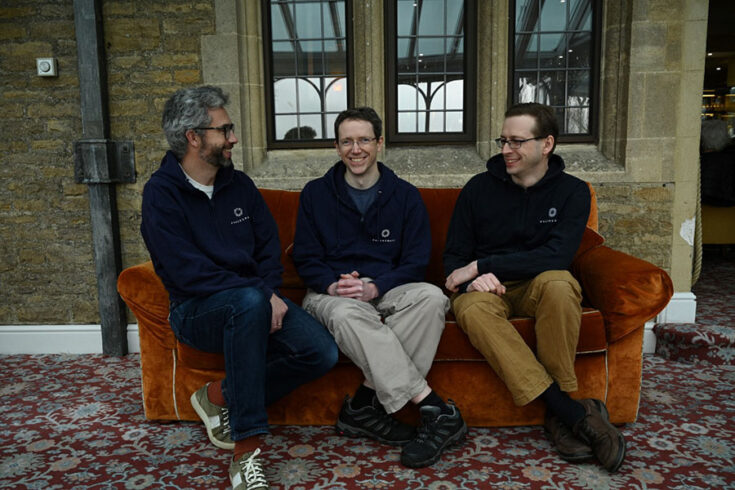While the progress in quantum hardware over the last three decades has been exceptional, quantum computers today are still not at the scale needed to run algorithms able to solve real-world problems. By building a company and bringing together some of the leading researchers in the field, we have created an ideal environment. This will deliver the tightly-focused mission of developing breakthrough algorithms able to change this paradigm and ensure that quantum computing moves from theory to reality, faster.
At Phasecraft, our journey into quantum computing started around 20 years ago. This was less than two decades after theoretical physicist Richard Feynman’s first paper introducing the idea that by harnessing quantum physics one could build a more powerful kind of computer.
At that time, the developments in theory and experiments were fast and exciting. I felt that it was something I wanted to contribute to which led to my PhD in quantum computing. Colleagues Toby Cubitt, who is Chief Technology Officer/Chief Scientific Officer at Phasecraft, and John Morton, who is a co-founder of Phasecraft, had the same passion and carried out their doctoral training in the same field.
Research acceleration
For the following 15 years we saw the field grow and the theory of quantum computing turn into something much closer to reality. I completed my PhD at the University of Bristol and won two Engineering and Physical Sciences Research Council (EPSRC) fellowships establishing myself as a leader in quantum algorithms and computational complexity. Toby won several fellowships in the UK and abroad from the Royal Society and others, his research focusing on mathematical physics and quantum information theory. John used his Royal Society fellowship and European Research Council grants to make advances on the experimental side of the field, with a particular interest in solid-state materials and devices for quantum technologies.
It was around 2017 to 2018 when we collectively realised that the amazing developments we had witnessed, and contributed to, throughout our careers had led to the field of quantum computing reaching a transition point. This transition being from a purely academic endeavour to something with real commercial potential. But while the progress made by quantum hardware was exciting, it was apparent to us that it just wasn’t enough and that to make the most of the available near-term hardware; what was needed was a breakthrough in quantum algorithms.
The opportunity for theorists
There was clearly an opportunity for theorists to play a significant role alongside experimentalists in building this new technology and taking it to the point where it was having an impact on real-world problems. But few theorists were doing so. We knew that our expertise and experience placed us in a unique position to enable this breakthrough.
By founding Phasecraft, we were able to take the knowledge we had built in academia and transfer it to a commercial setting. This is where we could build a team working together towards the common goal of developing quantum algorithms that could solve real-world problems in the near term. Between 2019 and 2020, with the support of great investors including the UCL Technology Fund, Parkwalk Advisors, LocalGlobe and Episode1 we were able to turn this vision into a reality. The Phasecraft team that started with just the three of us, soon grew to include half a dozen staff members. This included PhD students from EPSRC centres of doctoral training based in UCL and Bristol, and we were able to start proving that our idea had more than just potential.
Revolutionising the way challenges are tackled

Credit: James Crawford, Google Quantum AI
Although we have known for a long time that quantum computing could revolutionise the way we tackle complex challenges in a wide range of sectors. For example, the prediction of properties of complex materials, the optimisation of energy grids, and making groundbreaking discoveries in fundamental physics. The hardware that exists at the moment is still not capable of running the algorithms needed to find these answers.
In less than five years since founding Phasecraft, we have already developed a suite of radically more efficient quantum algorithms, suitable for implementation on near-term quantum computers.
The strength of our team has been complemented by a wide range of partnerships with companies performing internationally leading work on quantum hardware development (including Google, IBM and QuEra) and applications (for example, Johnson Matthey, BT, Oxford PV). These major industrial collaborations have been supported through six Innovate UK projects to accelerate the economic impact of quantum computing applications. They have been critical to ensure that our research is both focusing on what is important to users, and also grounded in what real quantum computing hardware can actually achieve.
Academia and industry interface
The field of quantum computing is still very much at the interface between academia and industry and we believe it is important to maintain a close relationship between these two sectors. Not only do we each maintain positions at our universities, but Phasecraft also benefits from close connections with a number of universities in the UK and abroad. This is through joint projects as well as via our internship scheme and by hosting PhD students.
Less than a year ago we reached another major milestone in Phasecraft’s journey, by raising £13 million series A funding round led by renowned Silicon Valley deeptech VC Playground Global. This has enabled us to continue growing our team of world-leading quantum scientists, researchers and engineers. It’s enabled us to take the next step towards delivering our vision for Phasecraft and – more broadly – for the field of quantum computing.
We are now in the position to apply our quantum algorithms to important problems in materials science (with results potentially leading to the development of more efficient batteries, photovoltaic cells and fuel cells), communications and energy networks (where there is a growing need for improved optimisation tools).
Find out more about Phasecraft.



